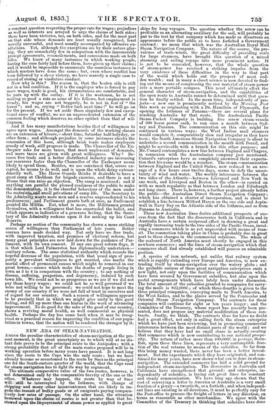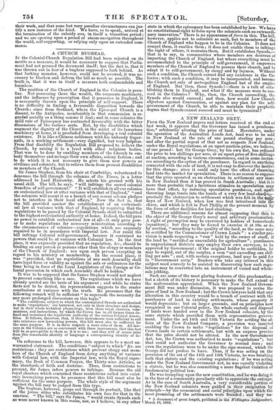NEW 2ERA OF ST - WOW-NAVIGATION.
Anoxia the peculiar characteristics of steam-navigation at the pre- sent moment, is the great uncertainty as to which will at no dis- tant date prove to be the principal route to the Antipodes; with a strong probability that all of the main routes proposed will be in working operation before many years have passed. It is not long since the route to the Cape was the only route ; but we have already become so accustomed to the route by Suez as the principal one for the South-eastern quarter of the world, that the Cape road for steam navigation. has to fight its way by argument. The ultimate comparative value of the two routes, however, is not determined only by the comparative brevity of the one or the other. Whatever may happen, the route by way of Suez be interrupted by the Isthmus, with change of shipping and many other inconveniences that are likely to im- pede_the transit of bulky goods or of emigrants paying compara- tively low rates of isassage.1 ,On the other hand, the attention bestowed upon the choice 'of?iontes is not greater than that be- stowed upon the linprevemenVed steam power as applied to great
ships for long voyages. The question whether the screw can be profitable as an alternating auxiliary for the sail, will probably be put to the test by that company which has made so disastrous an appearance before the public as to have forfeited a Government contract : we mean that which was the Australian Royal Mail Steam Navigation Company. The nature of the course, the pre- valence of trade-winds, the great difficulty of providing coals for large steamers, have brought this question of a mixed steaming and sailing voyage into more prominent notice. It is not to be concealed, however, that the whole question of steam-power has received a striking impulse from the very existence of these difficulties in the way to that part of the world which holds out the prospect of most sud- den wealth ; and in many a closet science is now devoted to find- ing out the means of compressing the raw material of steam-power into a more portable compass. This must ultimately affect the general character of steam-navigation, and the capabilities of the open route to Australia cannot be determined until that ques- tion be finally settled. In the mean time, independently of pro-
jects—a new one is prominently noticed by the Morning Post
this week as originating with a Dr. Hamilton of Plymouth, for opening the Isthmus of Panama—there are several plans for reaching Australia by that route. The Australasian Pacific Steam-Packet Company is building five screw steam-vessels of 300 horse power each, to run once a month between Syd- ney and Panama. The communication on this side might be continued in various ways : the West Indian mail steamers would complete it, comparatively slow and irregular as they have been ; the South American Steam Navigation Company is about to undertake a second communication in the month with Brazil, and might be serviceable with a branch for this other purpose; and Mr. Cunard contemplates a new line between England and Chagres, in connexion with the Australasian company just mentioned. Cunard's enterprises have so completely answered their expecta- tion that his name would be a voucher. The steam "simmunication between England and the United States, now reduced to an ave- rage of a few hours over twelve days, seems to defy the uncer- tainty of wind and water. The weekly intercourse between the two sides of the Atlantic—between Liverpool and New York in one week, and Liverpool and Boston in the other—is carried on with as much regularity as that between London and Edinburgh not long since. There is, however, a further project already before the public—the Australian Direct Steam Navigation Company ; which has obtained a charter of incorporation, and is about to establish a line between Milford Haven on the one side and Aspin- wall in Navy Bay on the Atlantic side of the Isthmus, and so from Panama to Australia.
These new Australian lines derive additional prospects of suc- cess from the fact that the discoveries both in California and in Australia have a certain reciprocal effect in drawing a great and
rapidly increasing trade to the two sides of the Paoifio Ocean, invol- ving a commerce which is as yet unprovided with means of tran-
sit. The commotion taking place in China is probably due in great part to these changes in the commercial relations. The whole of the seaboard of North America must shortly be engaged in this newborn commerce ; and the lines of steam-navigation which that commerce shall find already established will possess an admirable position.
A species of iron network, not unlike that railway system which is rapidly extending over Europe and America, is now ex- tending itself by steam-navigation over the watery globe ; and the probable success of these great navigation enterprises casts a new light, not only upon the facilities of communication which have been secured by Government subsidies, but also upon the
postal arrangements which have lately been under discussion. The total amount of the subsidies granted to companies for carry-
ing the mails is 822,0001.; of which three-fourths is given to the three principal companies, conveying mails to North America, to the West Indies, and to the places served by the Peninsular and Oriental Steam Navigation Company. The contracts for these companies will continue for eight or ten years longer ; and the Committee of the Treasury, whose report has recently been pre- sented, does not propose any material modification of these con- tracts. Justly, we think. The contracts thus far have no doubt had a great effect, not only in calling forth the steam enterprise
which we have just been reviewing, but in promoting commercial intercourse between the most distant parts of the world ; and we believe that they have had no small share in actually creating that commerce which is now contributing to our national prospe- rity. The return of rather more than 400,000/. in postage, there- fore, upon these three lines, represents a very contemptible frac- tion of the real returns by means of the subsidies. So far from this being money wasted, there never has been a better invest- ment. But the experiments which they have originated, and con- tinued for many years, have now shown what can be done in steam- navigation. The extended commerce has laid. i a solid ground for independent steam-navigation. The discoveries in Australia and California have strengthened that ground; and enterprise, in- dependently of subsidies, is laying out great lines for constant and steady communication. We have long ago shown that the cost of conveying a letter to America or Australia is a very small fraction of a penny—a twentieth, or a fortieth; and when independ- ent lines are existing in all directions, it must be perfectly easy for the Post-office to procure the freight of letters in any direction, on terms as reasonable as other merchandise. We agree with the Committee of the Treasury in thinking that subsidies have done
their work, and that none but very peculiar circumstances can jus- tify a new instance of the kind. We have, so to-speak, arrived at the termination of the subsidy sera, in itself a transition period ; and we are opening upon a period of steam-navigation throughout the world, self-supporting, or relying only upon an extended com- merce.



























 Previous page
Previous page